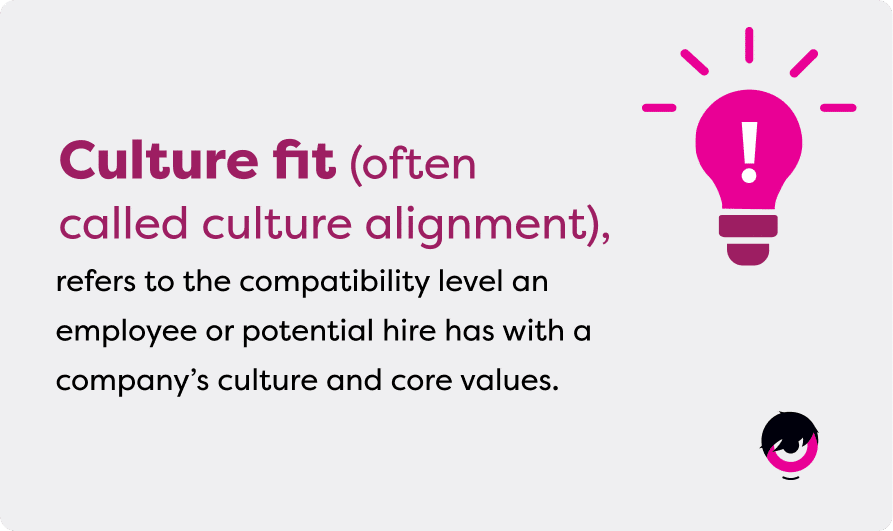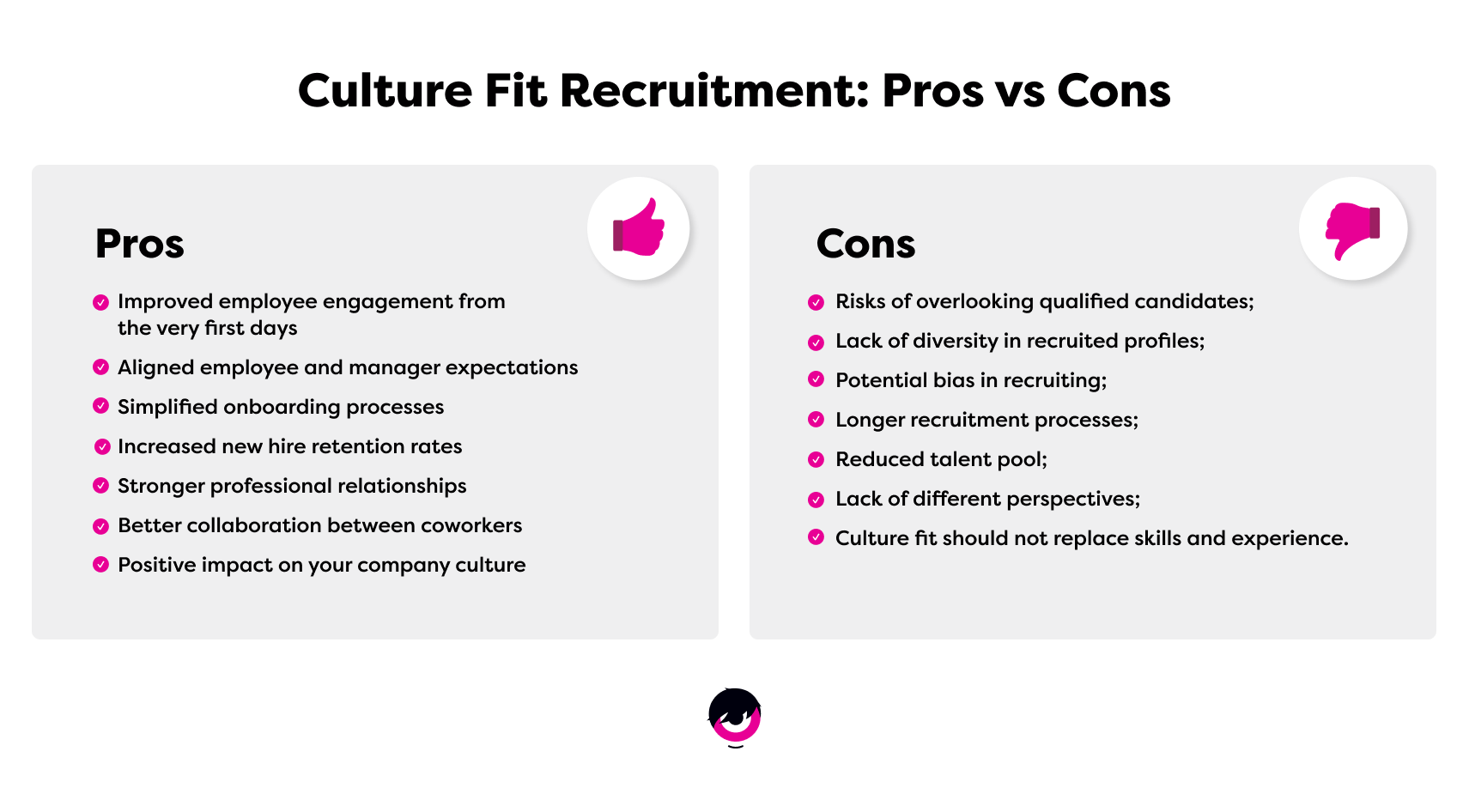Finding the best talent for your organization is not an easy task, especially when you want to focus on culture alignment and long-term employee retention and wellbeing. Beyond skills and diplomas, you sometimes need to find the specific profile that will integrate seamlessly into your team and feel right at home from the very first days.
That’s why culture fit interview questions are essential: they help you get an idea of who the candidate is, and how their personal values can align with your mission and culture. Without further ado, here is everything you need to know about culture alignment, and examples of culture fit interview questions you should ask your candidates!
What is Culture Fit?
Culture fit, often called culture alignment, refers to the compatibility level an employee or potential hire has with a company’s culture and core values. This includes sharing the same vision and expectations related to the working environment, understanding and relating to business goals and values, and displaying the soft skills required to integrate seamlessly into their future team.

The Benefits of Culture Fit Recruiting
To start with, candidates who are culture fits are more likely to be interested in job offers put out by your company – that is, if you have a strong employer brand and let it shine through in the job description. But there are other benefits to focusing on culture fit in your recruitment process:
- Improved employee engagement from the very first days;
- Aligned expectations of what responsibilities and working conditions are going to be like;
- Chances to increase new hire and employee retention rates;
- Simplified onboarding process and seamless integration into the organization;
- Stronger professional relationships with coworkers and team members;
- Increased collaboration between colleagues and creation of a healthy work environment;
- Likelihood that your new employees will become organic ambassadors for your company.
Surrounding yourself with colleagues who share the same professional vision and mission is also a great way to support business growth and performance.
The Potential Disadvantages of Culture Fit Recruiting
Just like any other recruitment practice, culture alignment comes with potential disadvantages that you need to be aware of:
- Risks of overlooking highly talented job candidates for the sake of culture alignment;
- Lack of diversity in recruited profiles and potential bias;
- Longer recruitment processes and depleted talent pools;
- Lack of different perspectives, experiences and insights can hinder innovation and growth.
While corporate culture is important, it should not be the only factor that influences hiring decisions. In any case, it is important to know how to identify potential recruits who could relate to your organizational culture while diversifying the profiles and skill sets that you integrate into your company.

45+ Examples of Culture Fit Questions You Should Ask During Interviews
Whether during your job interviews or through recruiting emails, you can evaluate a candidate’s alignment with company culture by asking the following questions:
Company Culture and Motivation
1) How would you describe our company culture?
2) What is the aspect you like the most about our company values?
3) What is the aspect you identify with the least in our company values?
4) Why are you leaving your current job?
5) How do you think your personal values can align with our mission?
6) Why did you apply for this role, and why did you choose our company?
7) What are 3 qualities you like most about yourself?
8) What are your 3 qualities people like the most?
9) How would you describe your ideal work environment?
10) What aspects of work motivate you the most?
11) What is your top benefit expectation when joining a company?
Collaboration and Professional Relationships
12) Are you open to receiving feedback from someone who is not your direct supervisor?
13) Did you ever ask your manager or coworkers for extra feedback?
14) How do you typically approach problem-solving with your team?
15) How and how often do you prefer to communicate with your team?
16) What qualities do you look for in a manager?
17) Did you have a manager you looked up to in the past, and why?
18) What aspects do you value most in professional relationships?
19) Do you prefer to work alone or to collaborate with others?
20) Do you think of yourself as a follower or a leader?
21) Can you share an example of a time you took the initiative on a project without being asked to?
22) If you notice that a colleague has made a mistake, how do you handle the situation?
23) If a coworker disagreed with you on how you work on a project, how would you handle the situation?
24) Have you ever handled conflicts with coworkers? If so, how?
25) Have you ever handled conflicts with customers? If so, how?
26) What are the most important aspects of professional relationships to you?
27) Have you ever had a difficult professional relationship, and why?
28) Have you ever had to deal with important changes in the workplace? How did you manage?
Job Satisfaction and Work-life Balance
29) How does your career resonate with your personal life and interests?
30) Have you ever been completely satisfied and happy at work, and why?
31) Have you ever been unhappy at work, and why?
32) How would you describe your perfect work schedule?
33) Do you ever work at home outside of regular work hours?
34) Do you enjoy flexibility in your work schedule?
Performance and Productivity
35) Do you prefer participating in decision-making or contributing to strategies and goals?
36) Is there an achievement you are particularly proud of?
37) Do you like your work to be challenging or easy-going?
38) Can you think of a time when you exceeded performance expectations?
39) How do you maintain productivity levels on a day-to-day basis?
40) Have you ever had to deal with a fast-paced environment and what is your preferred working style to deal with your daily workload?
Social Awareness and Future Ambitions
41) What do diversity and inclusion mean to you?
42) Do you expect your employer to be socially aware and responsible?
43) Have you ever worked with people from different backgrounds or perspectives?
44) Where do you see yourself in the next two years? What about the next five years?
45) When thinking about your long-term career, what would be your dream job?
Bonus Questions to Improve Your Candidate Interview Process
46) Do you see areas of improvement in our hiring or interview process?
47) Did you like our communication style during the interview and throughout the process?
48) Could we better highlight our culture and key values on our company website or job descriptions?
49) Do you think that our employer brand is attractive to job seekers?
While culture fit recruiting should not be the only basis for your recruitment strategy, it is an aspect you need to consider during your hiring process. It has many benefits for your company, notably when it comes to long-term employee retention and effective collaboration in the workplace. Remember that diverse skills, experiences, and perspectives are essential to ensuring your business growth. Focus on creating a strong corporate culture that attracts and retains the best talents; you will reach your goals in no time!
Need help recruiting candidates that align with your corporate culture?
Automate resume search and analysis with Folks ATS!

